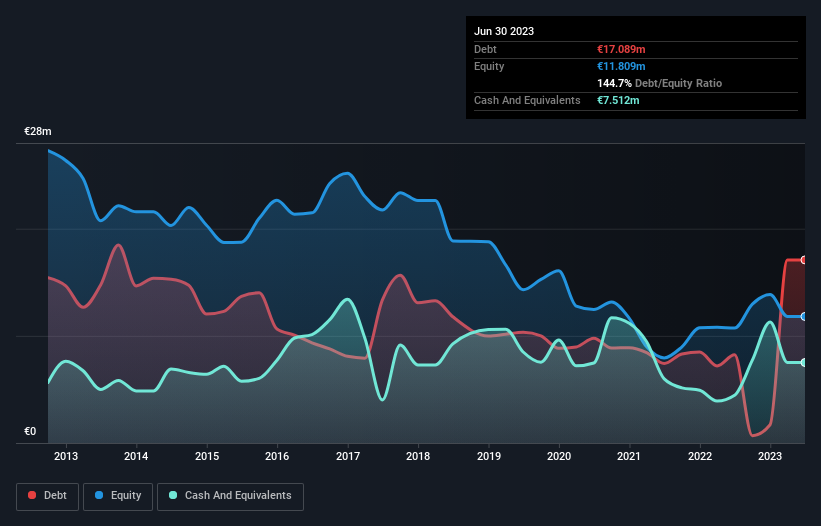
Some say volatility, rather than debt, is the best way to think about risk as an investor, but Warren Buffett famously said that 'Volatility is far from synonymous with risk.' It's only natural to consider a company's balance sheet when you examine how risky it is, since debt is often involved when a business collapses. As with many other companies Martela Oyj (HEL:MARAS) makes use of debt. But is this debt a concern to shareholders?
When Is Debt Dangerous?
Debt assists a business until the business has trouble paying it off, either with new capital or with free cash flow. Ultimately, if the company can't fulfill its legal obligations to repay debt, shareholders could walk away with nothing. However, a more frequent (but still costly) occurrence is where a company must issue shares at bargain-basement prices, permanently diluting shareholders, just to shore up its balance sheet. Having said that, the most common situation is where a company manages its debt reasonably well - and to its own advantage. The first thing to do when considering how much debt a business uses is to look at its cash and debt together.
View our latest analysis for Martela Oyj
What Is Martela Oyj's Net Debt?
You can click the graphic below for the historical numbers, but it shows that as of March 2023 Martela Oyj had €17.1m of debt, an increase on €8.23m, over one year. However, because it has a cash reserve of €7.51m, its net debt is less, at about €9.58m.

How Strong Is Martela Oyj's Balance Sheet?
We can see from the most recent balance sheet that Martela Oyj had liabilities of €29.0m falling due within a year, and liabilities of €14.6m due beyond that. On the other hand, it had cash of €7.51m and €16.9m worth of receivables due within a year. So it has liabilities totalling €19.2m more than its cash and near-term receivables, combined.
This deficit casts a shadow over the €7.73m company, like a colossus towering over mere mortals. So we'd watch its balance sheet closely, without a doubt. After all, Martela Oyj would likely require a major re-capitalisation if it had to pay its creditors today. When analysing debt levels, the balance sheet is the obvious place to start. But ultimately the future profitability of the business will decide if Martela Oyj can strengthen its balance sheet over time. So if you want to see what the professionals think, you might find this free report on analyst profit forecasts to be interesting.
Over 12 months, Martela Oyj made a loss at the EBIT level, and saw its revenue drop to €96m, which is a fall of 11%. That's not what we would hope to see.
Caveat Emptor
Not only did Martela Oyj's revenue slip over the last twelve months, but it also produced negative earnings before interest and tax (EBIT). Its EBIT loss was a whopping €4.5m. When we look at that alongside the significant liabilities, we're not particularly confident about the company. We'd want to see some strong near-term improvements before getting too interested in the stock. Not least because it had negative free cash flow of €1.2m over the last twelve months. So suffice it to say we consider the stock to be risky. There's no doubt that we learn most about debt from the balance sheet. But ultimately, every company can contain risks that exist outside of the balance sheet. To that end, you should be aware of the 2 warning signs we've spotted with Martela Oyj .
If, after all that, you're more interested in a fast growing company with a rock-solid balance sheet, then check out our list of net cash growth stocks without delay.
New: Manage All Your Stock Portfolios in One Place
We've created the ultimate portfolio companion for stock investors, and it's free.
• Connect an unlimited number of Portfolios and see your total in one currency
• Be alerted to new Warning Signs or Risks via email or mobile
• Track the Fair Value of your stocks
Have feedback on this article? Concerned about the content? Get in touch with us directly. Alternatively, email editorial-team (at) simplywallst.com.
This article by Simply Wall St is general in nature. We provide commentary based on historical data and analyst forecasts only using an unbiased methodology and our articles are not intended to be financial advice. It does not constitute a recommendation to buy or sell any stock, and does not take account of your objectives, or your financial situation. We aim to bring you long-term focused analysis driven by fundamental data. Note that our analysis may not factor in the latest price-sensitive company announcements or qualitative material. Simply Wall St has no position in any stocks mentioned.
About HLSE:MARAS
Martela Oyj
Operates in the workplace industry in Finland, Sweden, Norway, and internationally.
Undervalued with reasonable growth potential.
Market Insights
Community Narratives




